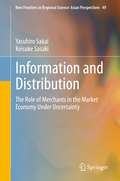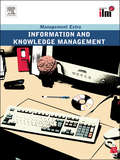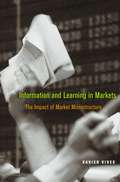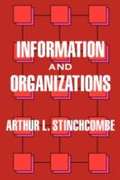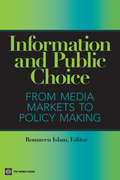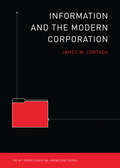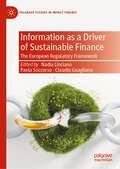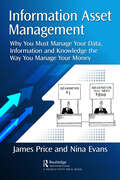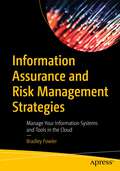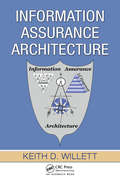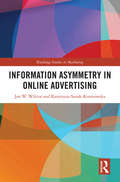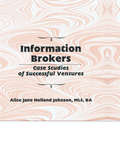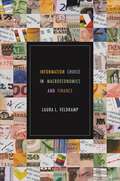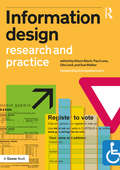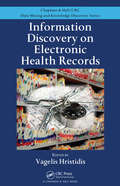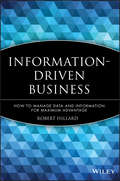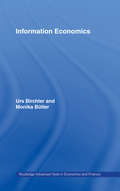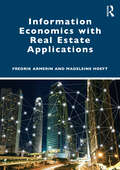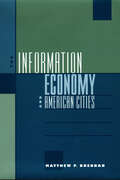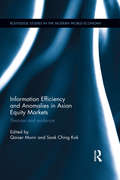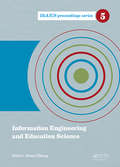- Table View
- List View
Information and Distribution: The Role of Merchants in the Market Economy Under Uncertainty (New Frontiers in Regional Science: Asian Perspectives #49)
by Yasuhiro Sakai Keisuke SasakiThe purpose of this book is to discuss the relationship between information and distribution, with special reference to the role of the merchant in a market economy under conditions of risk and uncertainty. By working with simple models of the market economy and conducting a sequence of comparative analyses, the authors shed new light on an important yet rather neglected area in economics. In a historical perspective, the merchants of Ohmi, the former name of Shiga Prefecture in western Japan, are known to have put great faith in the principles of Sampo Yoshi or the all-around advantages of trading. It is hoped that the results presented in this book will provide some solid ground for such an old principle that can be seen in a new light. Applications to regional and many related problems are also discussed here. A distribution system is broadly defined as the systematic mechanisms and structures that regulate business operations, and its function is to maximize corporate value. Some of the following functions have previously been identified as distinguishing features of the Japanese distribution system compared with distribution systems in Europe and the United States: not only transactions, transportation, and storage, but also information, risk-bearing functions, and other characteristics. This book provides an overview of the distribution system in Japan, including changes that its practice have undergone and its current state; identifies current problems; and considers how these problems should be addressed.
Information and Knowledge Management Revised Edition: Revised Edition (Management Extra Ser.)
by ElearnStuck for ideas, inspiration or just want to work differently? Management Extra brings all the best management thinking together in one package. The books are practical and well structured to provide an in depth treatment of these management topics. Titles in the series: * Business Environment * Change Management * Development for High Performance * Effective Communications * Financial Management * Information and Knowledge Management * Leadership and Management in Organisations * Leading Teams * Making Sense of Data and Information * Managing Markets and Customers * Managing for Results * Managing Health, Safety and Working Environment * Managing Legal and Ethical Principles * Managing Yourself * Positive Working Relationships * Project Management * Quality and Operations Management * Reaching Your Goals Through Innovation * Recruitment and Selection * Reputation Management The series fuses key theories and concepts with applied activities to help managers examine how they work in practice. The books are created with individuals in mind. They are designed to help you improve your management skills. Management Extra can also be used in conjunction with management programmes of study aligned to standards. Each of the books has case studies, self assessments and activities all underpinned by knowledge and understanding of the frameworks and techniques required to improve performance. Management Extra provides managers and trainers with a handbook for action and development. "You found it – what a find! A practical resource packed with all the relevant theory and suggested activities to support your professional development. An essential resource to have at your fingertips, jump in and enjoy."--Russell Jeans, Learning and Development Manager, ntl "All the essential concepts are here, presented in an easily digestible format with lots of up to date case studies and references – but, most importantly, with plenty of thought provoking activities and self-diagnostic exercises to make the learning personal and transferable."--Peter Manning, Head of Training & Development, News International Newspapers Ltd
Information and Learning in Markets: The Impact of Market Microstructure
by Xavier VivesThe ways financial analysts, traders, and other specialists use information and learn from each other are of fundamental importance to understanding how markets work and prices are set. This graduate-level textbook analyzes how markets aggregate information and examines the impacts of specific market arrangements--or microstructure--on the aggregation process and overall performance of financial markets. Xavier Vives bridges the gap between the two primary views of markets--informational efficiency and herding--and uses a coherent game-theoretic framework to bring together the latest results from the rational expectations and herding literatures. Vives emphasizes the consequences of market interaction and social learning for informational and economic efficiency. He looks closely at information aggregation mechanisms, progressing from simple to complex environments: from static to dynamic models; from competitive to strategic agents; and from simple market strategies such as noncontingent orders or quantities to complex ones like price contingent orders or demand schedules. Vives finds that contending theories like informational efficiency and herding build on the same principles of Bayesian decision making and that "irrational" agents are not needed to explain herding behavior, booms, and crashes. As this book shows, the microstructure of a market is the crucial factor in the informational efficiency of prices. Provides the most complete analysis of the ways markets aggregate information Bridges the gap between the rational expectations and herding literatures Includes exercises with solutions Serves both as a graduate textbook and a resource for researchers, including financial analysts
Information and Organizations
by Arthur L. StinchcombeIn a mix of theoretical insights and anecdotal material, this book explores the ins and outs of organizations from both a macro and micro perspective that has long confronted business people and those interested in organizational theory.
Information and Public Choice: From Media Markets to Policymaking
by Roumeen IslamThe ability of the media to affect outcomes in economic and political markets has been well documented. News reporting and advertising influence consumer behavior in goods and services markets by revealing (or selectively revealing) information about a product, acting as agenda setters to influence consumer demand, or enhancing competition in markets by alerting consumers to substitutes. In political markets, they can affect behavior by informing voters about a politician's views or actions, enlightening citizens to outcomes of public policy, or taking a stance on political, social, or economic issues. For businesses, households, and most others, the media is the main source of information on public policy choices and current social and economic conditions. As a result, what news the media chooses to gather, analyze and disseminate--and the slant they choose to put on what they report--is of consequence. 'Information and Public Choice' addresses the factors that affect the content and reach of news coverage as well as its impact on public policy. The book addresses both market constraints that affect media--particularly news content--and the impact that news reporting has on economic and political choices. The authors examine a range of issues, including bias or slant in media reporting, the impact of markets and nonmarket factors on news reporting, and the role of government regulation of the media sector in developing countries. The studies in this volume provide new evidence and a good summary of previous research on the power of the media. An invaluable guide for those concerned about the impact of media on economic and political outcomes, 'Information and Public Choice' draws attention to an under-researched yet important area of economics.
Information and the Modern Corporation (The MIT Press Essential Knowledge series)
by James W. CortadaA guide to information as the transformative tool of modern business.While we have been preoccupied with the latest i-gadget from Apple and with Google's ongoing expansion, we may have missed something: the fundamental transformation of whole firms and industries into giant information-processing machines. Today, more than eighty percent of workers collect and analyze information (often in digital form) in the course of doing their jobs. This book offers a guide to the role of information in modern business, mapping the use of information within work processes and tracing flows of information across supply-chain management, product development, customer relations, and sales. The emphasis is on information itself, not on information technology. Information, overshadowed for a while by the glamour and novelty of IT, is the fundamental component of the modern corporation.In Information and the Modern Corporation, longtime IBM manager and consultant James Cortada clarifies the differences among data, facts, information, and knowledge and describes how the art of analytics has all but eliminated decision making based on gut feeling, replacing it with fact-based decisions. He describes the working style of “road warriors,” whose offices are anywhere their laptops and cell phones are and whose deep knowledge of a given topic becomes their medium of exchange.Information is the core of the modern enterprise, and the use of information defines the activities of a firm. This essential guide shows managers and employees better ways to leverage information—by design and not by accident.
Information as a Driver of Sustainable Finance: The European Regulatory Framework (Palgrave Studies in Impact Finance)
by Nadia Linciano Paola Soccorso Claudia GuaglianoThe Sustainable Development Goals introduced by the United Nations in 2016 call for the significant mobilisation of finance. However, although sustainable investments are steadily increasing, there still remain large gaps within financing and the information that financial markets rely on is often incomplete or incorrect. For instance, the financial system has been structured around short-term frameworks and goals while the most pressing environmental and social challenges are long-term. Prices do not convey the cost of externalities associated with social and environmental challenges. It is therefore important to implement the effective pricing of externalities and create a common language and taxonomy between investors, issuers and policy-makers in order to best serve sustainable development. Addressing this challenge, the authors delve deeper into the levers that can be pulled within the financial system to prompt an efficient ecosystem of sustainability-related information, allowing social and environmental externalities to be incorporated into the decision-making process of all market agents. Incentives needed for investors, issuers and intermediaries are proposed along with regulation that can trigger these incentives. This book offers a comprehensive collection of chapters which explore the ongoing evolution of the European regulatory framework, providing essential reading for policymakers, practitioners and researchers alike.
Information Asset Management: Why You Must Manage Your Data, Information and Knowledge the Way You Manage Your Money
by James Price Nina EvansOrganisations are using data, information and knowledge as a competitive weapon. Their data, information and knowledge are arguably their most valuable assets. Yet, this fourth asset is managed badly when compared to the other three assets, namely money, people and infrastructure with considerable risk to the organisation. Executives are accountable for the success of their organisations, and those who don’t manage this critical resource and business enabler effectively can be regarded as negligent. Information Assets carry enormous risk and value. Most boards and executives don’t know how to govern and manage IAs effectively and nobody is held accountable. Given this, organisations should govern and manage their Information Assets the way they manage their Financial Assets. The benefits of managing IAs well are compelling. These benefits include increased efficiency, productivity, employee satisfaction, improved decision-making, mitigating business risk and improving product, protecting corporate reputation and service delivery. Drawing on ground-breaking research, this book explains why Information Assets are so important to organisations and the barriers to managing them well. This book is unique in the sense that it takes a fresh look at this topic, is based on experience and research, and includes interviews from more than 70 industry leaders. In short, this book is written by executives and explains where to start.
Information Assurance and Risk Management Strategies: Manage Your Information Systems and Tools in the Cloud
by Bradley FowlerLearn how to deploy information assurance risk management strategies that align with the National Institute of Standards and Technology’s recommendations. This book will show you how to implement information assurance risk management strategies within your organization. Aimed at system administrators and cybersecurity practitioners, author Bradley Fowler first walks you through how to assess known risks in your organization, understand why using a risk mitigation security strategy control profile is essential, and how to create one for your organization. You will then learn how to develop a risk factor table, outlining descriptions for each risk factor within your organization and which software applications you’ll need to rely on for daily business communication and operations. You will also see how to assess and categorize the level of risk within each technology tool, as well as the impact of an information security breach on the organization. As you progress through the book, you'll review privacy issues relating to your organization, develop and manage a privacy compliance risk profile, and develop and manage a privacy compliance control profile. Additionally, you will gain insight into creating a privacy compliance risk mitigation strategy that helps protect your organization even as security threats evolve. Take the first step to safeguarding your company’s highly valuable information assets today! What You'll Learn Understand what information assurance is and how it relates to risk management strategiesAssess, develop, implement, and manage risk management strategies for corporate information systems, technology, and cloud environmentsDevelop and utilize information usage profiles and risk factor tablesUnderstand the value of data encryption and usage of private and public key exchange for information assurance and security Who This Book Is For Information system and cloud architects responsible for developing, implementing, and managing corporate information systems and cloud environments.
Information Assurance Architecture
by Keith D. WillettExamining the importance of aligning computer security (information assurance) with the goals of an organization, this book gives security personnel direction as to how systems should be designed, the process for doing so, and a methodology to follow. By studying this book, readers will acquire the skills necessary to develop a security architecture that serves specific needs. They will come to understand distinctions amongst engineering architecture, solutions architecture, and systems engineering. The book also shows how the Zachman and the Federal Enterprise Architecture models can be used together to achieve the goals of a business or government agency.
Information Asymmetry in Online Advertising (Routledge Studies in Marketing)
by Jan W. Wiktor Katarzyna Sanak-KosmowskaAdvertising is a company’s major form of communication with the market; it is a component of the IMC system, having a special impact on the addressee, and is a form of persuasive communication affecting consumer behaviour. Advertising may reflect information asymmetry between an advertiser and recipients. This book presents an assessment of the forms and range of consumer behaviour manipulation through information asymmetry in online advertising and explores the possible causes, forms, and effects. The work offers a new approach to the role of advertising in the digital world, especially its forms and impact strategies. The theoretical framework presented is based on issues related to online advertising, information asymmetry, and social manipulation. The book describes the ways in which these areas can be explored, and it presents the results of empirical studies. Empirical research allows for identifying companies’ moral hazard strategies and their consequences – e-consumers’ adverse selection. The research provides an empirical answer to the question: to what extent is advertising a transparent form of communication, and to what extent does it represent the world of manipulation? Based on an interdisciplinary theoretical approach, empirical studies conducted by the authors, and theoretical and managerial implication, the book encourages its readers to find their own answers. Given the interdisciplinary nature of this work, it will be of interest to scholars and researchers within the fields of marketing, media and communication, economics, psychology, sociology, and ethics.
Information Brokers: Case Studies of Successful Ventures
by Alice J JohnsonThe perfect guide to jumpstart an information brokerage firm!Here is an instructive guide for any librarian planning to start an information brokerage, whether as an entrepreneur or as a member of a document delivery group in a library. The methods used by successful firms and librarians are gathered together in this helpful book. Information Brokers: Case Studies of Successful Ventures identifies specific skills and relevant characteristics required to establish a successful information brokerage firm, and provides a descriptive model to assist you in running an information brokerage firm as a viable business venture.This guide is full of information gleaned from questionnaires sent to successful information brokerages throughout the United States and from in-depth interviews conducted with the principals of six of these firms. During the interviews, these individuals were questioned about many relevant issues of the field including: establishment of the business company history what specifically made each business a success general concepts concerning information brokering pertinent literature that helped them, and can help youLibrarians looking for a career change or who find their jobs in jeopardy as a result of budget cuts may want to look into the field of information brokerage. With Information Brokers: Case Studies of Successful Ventures, you can discover if the information brokerage field is for you!
Information Capital Readiness
by Robert S. Kaplan David P. NortonInformation capital is the raw material for creating value in the new economy. Information capital, consisting of systems, databases, libraries, and networks, makes information and knowledge available to the organization. This chapter focuses on evaluation of information capital based on strategic alignment, measuring how it contributes to the organization's strategic objectives.
Information Choice in Macroeconomics and Finance
by Laura L. VeldkampAn authoritative graduate textbook on information choice, an exciting frontier of research in economics and financeMost theories in economics and finance predict what people will do, given what they know about the world around them. But what do people know about their environments? The study of information choice seeks to answer this question, explaining why economic players know what they know—and how the information they have affects collective outcomes. Instead of assuming what people do or don't know, information choice asks what people would choose to know. Then it predicts what, given that information, they would choose to do. In this textbook, Laura Veldkamp introduces graduate students in economics and finance to this important new research.The book illustrates how information choice is used to answer questions in monetary economics, portfolio choice theory, business cycle theory, international finance, asset pricing, and other areas. It shows how to build and test applied theory models with information frictions. And it covers recent work on topics such as rational inattention, information markets, and strategic games with heterogeneous information.Illustrates how information choice is used to answer questions in monetary economics, portfolio choice theory, business cycle theory, international finance, asset pricing, and other areasTeaches how to build and test applied theory models with information frictionsCovers recent research on topics such as rational inattention, information markets, and strategic games with heterogeneous information
The Information Content of Money in Forecasting Euro Area Inflation
by Helge Berger Emil StavrevA report from the International Monetary Fund.
Information Design: Research and Practice
by Alison Black Paul Luna Ole Lund Sue WalkerInformation Design provides citizens, business and government with a means of presenting and interacting with complex information. It embraces applications from wayfinding and map reading to forms design; from website and screen layout to instruction. Done well it can communicate across languages and cultures, convey complicated instructions, even change behaviours. Information Design offers an authoritative guide to this important multidisciplinary subject. The book weaves design theory and methods with case studies of professional practice from leading information designers across the world. The heavily illustrated text is rigorous yet readable and offers a single, must-have, reference to anyone interested in information design or any of its related disciplines such as interaction design and information architecture, information graphics, document design, universal design, service design, map-making and wayfinding.
Information Discovery on Electronic Health Records (Chapman & Hall/CRC Data Mining and Knowledge Discovery Series)
by Vagelis HristidisExploiting the rich information found in electronic health records (EHRs) can facilitate better medical research and improve the quality of medical practice. Until now, a trivial amount of research has been published on the challenges of leveraging this information. Addressing these challenges, Information Discovery on Electronic Health Records exp
Information-Driven Business
by Robert HillardInformation doesn't just provide a window on the business, increasingly it is the business. The global economy is moving from products to services which are described almost entirely electronically. Even those businesses that are traditionally associated with making things are less concerned with managing the manufacturing process (which is largely outsourced) than they are with maintaining their intellectual property. Information-Driven Business helps you to understand this change and find the value in your data. Hillard explains techniques that organizations can use and how businesses can apply them immediately. For example, simple changes to the way data is described will let staff support their customers much more quickly; and two simple measures let executives know whether they will be able to use the content of a database before it is even built. This book provides the foundation on which analytical and data rich organizations can be created. Innovative and revealing, this book provides a robust description of Information Management theory and how you can pragmatically apply it to real business problems, with almost instant benefits. Information-Driven Business comprehensively tackles the challenge of managing information, starting with why information has become important and how it is encoded, through to how to measure its use.
Information Economics (Routledge Advanced Texts in Economics and Finance)
by Urs Birchler Monika BütlerThis new text book by Urs Birchler and Monika Butler is an introduction to the study of how information affects economic relations. The authors provide a narrative treatment of the more formal concepts of Information Economics, using easy to understand and lively illustrations from film and literature and nutshell examples. The book first covers the economics of information in a 'man versus nature' context, explaining basic concepts like rational updating or the value of information. Then in a 'man versus man' setting, Birchler and Butler describe strategic issues in the use of information: the make-buy-or-copy decision, the working and failure of markets and the important role of outguessing each other in a macroeconomic context. It closes with a 'man versus himself' perspective, focusing on information management within the individual. This book also comes with a supporting website (www.alicebob.info), maintained by the authors.
Information Economics with Real Estate Applications
by Fredrik Armerin Madeleine Viktoria HoeftInformation Economics with Real Estate Applications provides the reader with an academic toolkit to understand strategic interactions of individuals and companies in a world of scarce resources and asymmetric information. Beyond theoretical frameworks and models, examples in the real estate and construction industry are used to illustrate the practical relevance of the concepts discussed. Property developers, brokers, construction firms and investment managers – as individuals or companies – make decisions in response to their clients’, customers’ and partners’ behaviours. To align conflicting interests and achieve optimal outcomes for individuals, companies and society at large, those interactions need to be governed efficiently. Using models from microeconomics and contract theory, this book helps the reader to analyse the complex relations between different industry stakeholders from the perspective of markets and organisations. Although it mainly targets students at the Masters or PhD level in real estate or similar subjects without previous knowledge in information economics, the general theory presented should be of interest to any student who wants an introductory text in information economics. At the same time, by building upon real-world examples, the book allows industry practitioners to reflect on and optimise their strategic decision-making in a more structured way.
Information Economy: What Every Manager Should Know
by Carl Shapiro Hal R. VarianTechnologies change--economic principles do not. This chapter overviews such concepts as the production costs of information goods, the nature of intellectual property, systems competition, switching costs, positive feedback loops, network effects, and standards setting in terms of the strategies that will prevail in our hyper-connected economy.
The Information Economy and American Cities
by Matthew P. DrennanHow can metropolitan regions remain prosperous and competitive in a rapidly changing economy? Challenging some long-standing assumptions, Matthew Drennan argues that those regions that have invested heavily in the information economy have done much better than those that continue to rely on manufacturing and industry as their base. Moreover, he contends, the benefits of that growth reach the urban working poor, earlier reports to the contrary notwithstanding.The Information Economy and American Cities provides a wealth of rigorously analyzed econometric data which will be of great value to economists, planners, and policymakers concerned with the future of America's metropolitan areas. Additional supporting data will be made available online. Not just another glib cheer for the information economy, this book provides the kind of hard evidence needed to advocate effectively for change.
The Information Economy and American Cities
by Matthew P. DrennanData on how cities have adapted to changing times: &“An excellent analysis of the rise and role of the information sector . . . in regional economic development.&” — Regional Science and Urban Economics How do metropolitan regions remain prosperous and competitive in a rapidly changing economy? Using hard data, Matthew Drennan shows that those regions that have invested heavily in the information economy have done much better than those that continue to rely on manufacturing and industry as their base. Moreover, he contends, the benefits of that growth reach the urban working poor, earlier reports to the contrary notwithstanding. The Information Economy and American Cities provides a wealth of rigorously analyzed econometric data of great value to economists, planners, and policymakers concerned with the future of America&’s metropolitan areas, and provides the kind of hard evidence needed to advocate effectively for change.</
Information Efficiency and Anomalies in Asian Equity Markets: Theories and evidence (Routledge Studies in the Modern World Economy)
by Qaiser Munir Sook Ching KokThe efficient market hypothesis (EMH) maintains that all relevant information is fully and immediately reflected in stock prices and that investors will obtain an equilibrium rate of return. The EMH has far reaching implications for capital allocation, stock price prediction, and the effectiveness of specific trading strategies. Equity market anomalies reflect that the market is inefficient and hence, contradicts the EMH. This book gathers both theoretical and practical perspectives, by including research issues, methodological approaches, practical case studies, uses of new policy and other points of view related to equity market efficiency to help address the future challenges facing the global equity markets and economies. Information Efficiency and Anomalies in Asian Equity Markets: Theories and evidence is an insightful resource that will be useful for students, academics and professionals alike.
Information Engineering and Education Science: Proceedings of the International Conference on Information Engineering and Education Science (ICIEES 2014), Tianjin, China, 12-13 June, 2014 (IRAICS Proceedings)
by Dawei ZhengThis proceedings volume contains selected papers presented at the 2014 International Conference on Information Engineering and Education Science (ICIEES 2014), held June 12-13 in Hong Kong, China. The objective of ICIEES 2014 was to provide a platform for researchers, engineers, academics as well as industry professionals from all over the world to
